
13 minute read
Woods and Water: Local Resorts That Embody These Oregon Elements
Woods and Water
Whether you prefer water or trees—or even golf tees—Oregon’s resorts have the vacation you seek (Plus: A brief history of the tribes behind local casinos)
written by Kevin Max and Sheila G. Miller
Water
Water is in an Oregonian’s DNA. From Portland, where rain falls winter and spring, to the coast, where the Pacific Ocean laps our shores, to Central and Eastern Oregon, where the Deschutes, the Columbia, the Grande Ronde and John Day rivers run, water is at the center of our world.
Given our connection with water, it’s no surprise that we seek rivers, lakes or the sea when we travel. Here, we explore Oregon’s best resorts and hotels that are bound to the water.
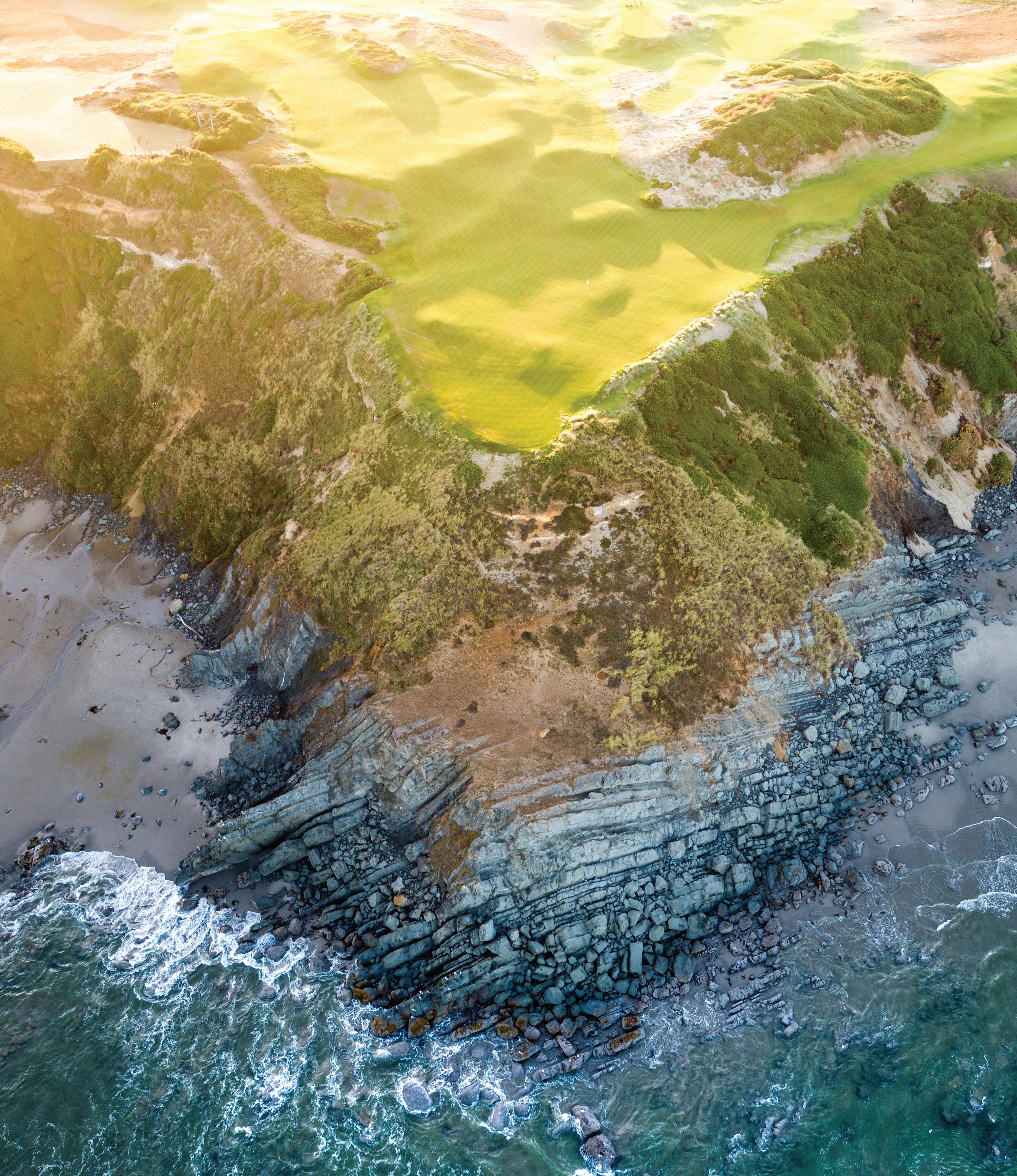
Bandon Dune’s Sheep Ranch golf course is a golfer’s dream.
Bandon Dunes Golf Resort
Lake of the Woods Resort (KLAMATH FALLS)
If rustic is your fancy, Lake of the Woods Resort will appeal to your senses. Tucked into the mountains west of Klamath Falls and sitting on the edge of Lake of the Woods, this resort is known for fishing, birding and hiking. In summer, this clear lake is also used for waterskiing, canoeing, even scuba. Lake of the Woods restaurant beckons with prime rib dinners, a meatloaf sandwich and blackberry chicken.
Each of the thirty-three cabins on the property has its own character. Some of the cabins have gas stoves to cozy up to, or stay warm under down comforters and Pendleton blankets. If you’re interested in sleeping under the stars, there are U.S. Forest Service campgrounds on site as well. Plus, there’s a universal season pass for the lake and its neighbor, 4 Mile Lake, for $40 (or $6 per vehicle per day).
Overleaf Lodge & Spa (YACHATS)
Sleep comes easier at the Oregon Coast. That’s certainly true at Overleaf Lodge, which sits on cliffs overlooking the Pacific in Yachats. Yes, you could spend a delightful weekend here looking at the ocean while drifting in and out of sleep. But Overleaf’s amenities make a visit more eventful.
First on the list is the spa, which has a full menu of massage, facial and other services, as well as an ocean-facing pool and hot tub, and a sauna and steam room. Then check out the weekly wine tastings, the complimentary breakfast, and the fresh, frozen and canned fish available for sale in the lobby each day.
Use the Overleaf as a jumping-off point for coast adventures—see the sea lions, hike up to lighthouses, or explore aquatic life in tidepools. You can also stay above it all and take a seat, grab a glass of local wine from the Overleaf wine cellar and watch the tides go in and out.
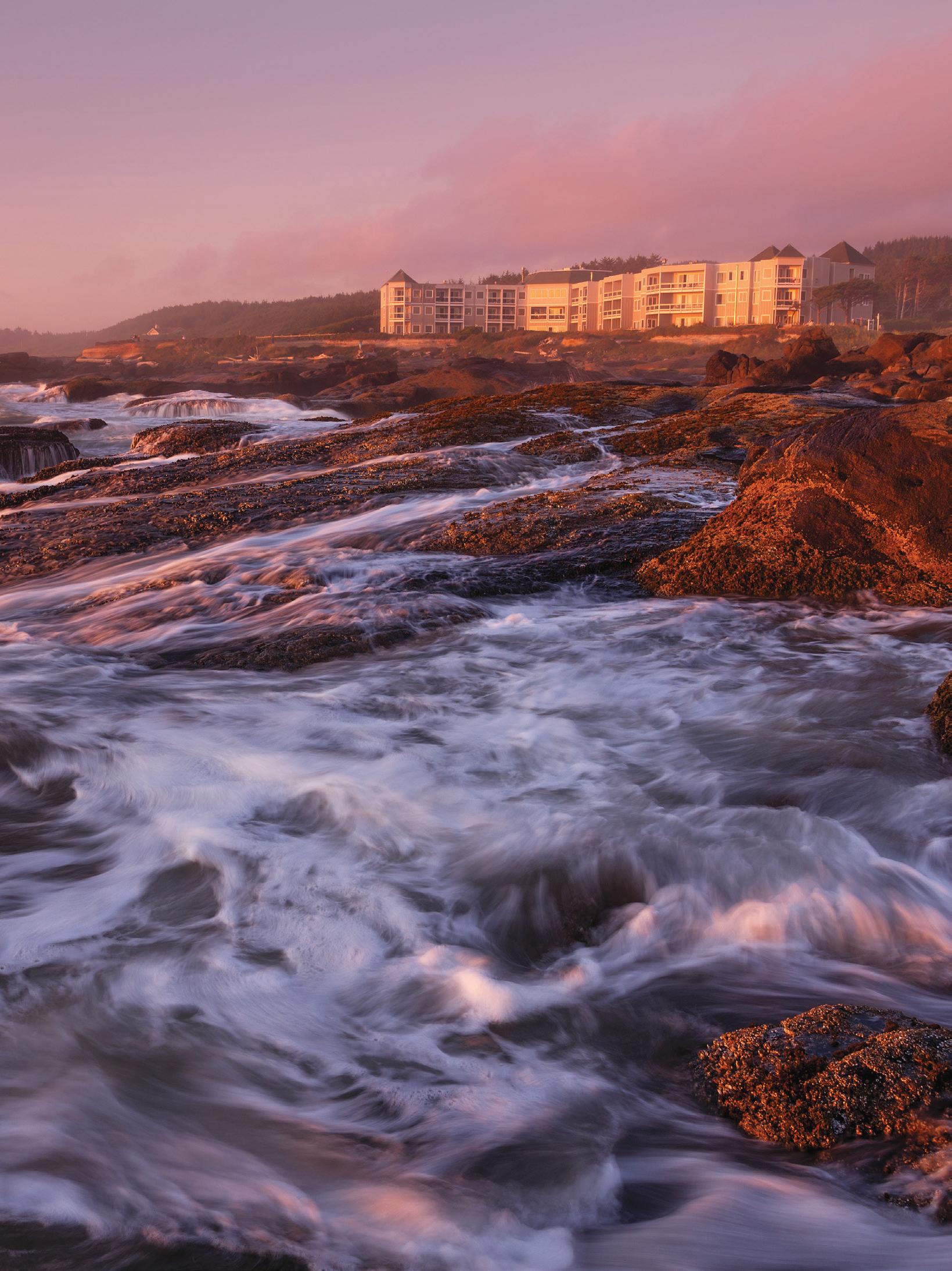
Overleaf Lodge & Spa sits on the Pacific Ocean.
Overleaf Lodge
Steamboat Inn (IDLEYLD PARK)
If you’re hoping to take solitude to the next level, Steamboat Inn is your spot. Sitting atop a bluff above the North Umpqua River, this property has beautiful gardens, a restaurant that serves locally sourced gourmet meals with local wine, and the rush of the Umpqua River along the floor of the national forest.
There are a number of options for stays—from cabins to suites to cottages and three-bedroom houses. No matter what, you’ll be there to disconnect, as there is no wifi, TVs or other electronics, which means you can enjoy a digital detox. Grab a book and sit by the fire in the library, tuck in to a Northwest-inspired meal made from scratch at the restaurant, and explore the waterfalls and solitude of the North Umpqua River. If you’re into fly-fishing, this is a postcard for anglers. You’ll find nearby hiking and biking trails—and Crater Lake National Park is just 72 scenic miles away.
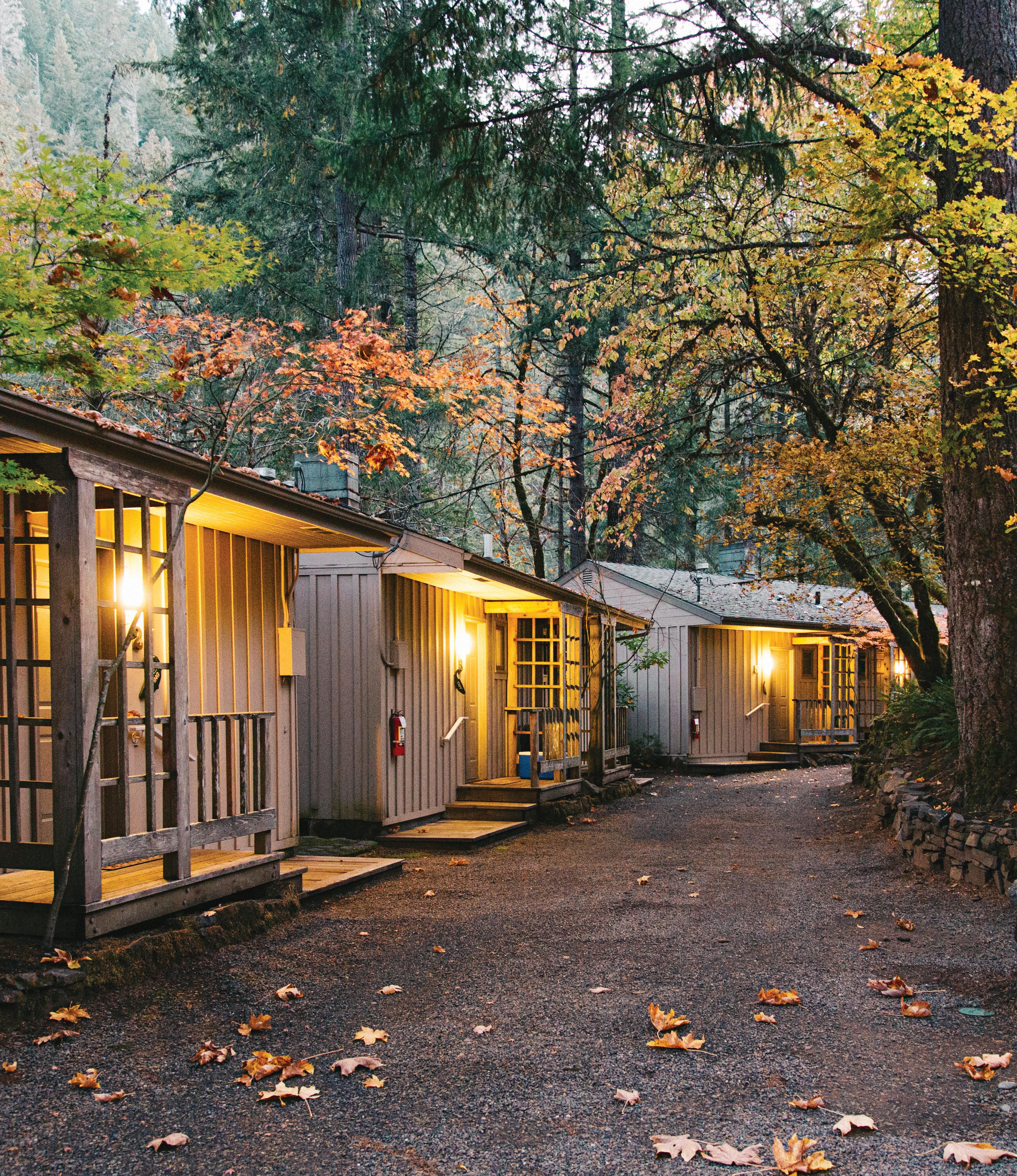
Steamboat Inn’s riverview cabins will get you away from it all.
Stevi Sayler Photography/Steamboat Inn
Columbia Gorge Hotel & Spa (HOOD RIVER)
Romance resides on the grounds of the Columbia Gorge Hotel & Spa. The forty rooms at this stunning property have views of the Columbia River, lush gardens of topiary and tulips and tucked-away nooks to steal a kiss. The spa at the hotel may be small, but what it lacks in size it makes up for in quality. Fresh pears and apples at the front desk come from the local terroir of Hood River’s produce-laden Fruit Loop.
The rooms feel old-fashioned in a charming, luxurious way, and the restaurant serves roast duck and lamb and filet mignon, and Columbia River steelhead cake for a starter. The Valentino Lounge has a full bar and happy hour 4 p.m to 6 p.m. on weekdays. The hotel is also close to the action of Hood River, so you’ll be able to experience more fine dining, craft breweries and wine that makes this small town feel big.
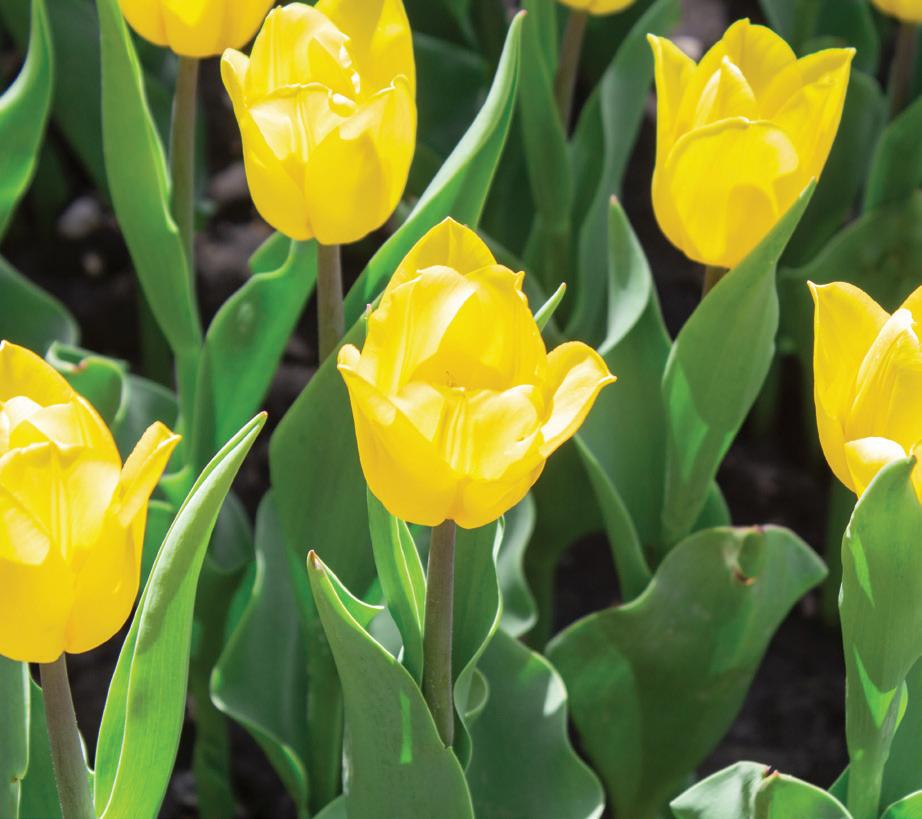
Gardens abound at the Columbia Gorge Hotel & Spa.
Woods
A walk in the woods, forest therapy or Waldenlust—all trails lead to a place where the mind is calm. The woods will take you deep into a place where letting go and cutting cords go hand in hand along its forest trails.
FivePine Lodge (SISTERS)
FivePine Lodge in Sisters is a walk in the woods nicely interrupted with modern cabins, nicely appointed rooms with Missionstyle furniture, down quilts, a gas fireplace, a sunken tub in the Romance Cabin and a full spa on the campus. Outside, traipse into the Sisters National Forest and along the 25-mile Peterson Ridge trail network on foot or mountain bike. For a truly pristine walk in the woods, head farther south on Three Creeks Road to the trailhead for Whychus Creek Trail. Back in town, reward yourself with a pint and a plate at Three Creeks Brewery, one of the amazing nearby bakeries or a film from the Sisters Movie House in a modern red barn, before returning to your cozy cabin at FivePine.
Wallowa Lake Lodge (JOSEPH)
On the banks of the pastoral Wallowa Lake and surrounded by the Wallowa-Whitman National Forest and Eagle Cap Wilderness, Wallowa Lake Lodge and its rustic cabins are the consummate wooded retreat. Wallowa Lake Lodge has a seasonal lodge with twenty-two rooms and eight small cabins open year-round with views of the lake. This is where you take yourself to attempt a digital detox, as cell service is scarce but the Chief Joseph, Aneroid Lake and West Fork trailheads into Eagle Cap Wilderness are just a mile walk away. Bighorn sheep, deer, bears, waterfalls and the snowy peaks in the Wallowas are compelling natural media, without having to resort to posting photos of your feet.
The Camas dining room at the lodge is open from Memorial Day and through the summer. In Joseph, many options abound, including Vali’s Alpine Restaurant with Hungarian cuisine, Old Town Cafe and Embers Brew House.
Metolius River Resort (CAMP SHERMAN)
In the shadow of Mount Washington and Three Fingered Jack, Metolius River Resort is a sanctuary seeded with monster Ponderosa pines. The campus features eleven modern cabins, many with full kitchens and river rock fireplaces, but all with access to hiking trails to the crystal Metolius River and its headwaters, marking the spot where the river comes out of the ground. If you’ve never been to a riverhead before, this, one of the largest spring-fed rivers in the country, is an aqueous nativity scene and awe inspiring. For dining, there is Hola!, a restaurant that serves nouveau Mexican and Peruvian dishes, such as pork tamales and Peruvian ribs and potatoes. Also nearby is the Camp Sherman Store, with some gourmet goods and local wines. In the summer, hop on the nearby storied Pacific Crest Trail or plan on knocking off a bit of the 22-mile Three Fingered Jack Loop.
Callahan’s Mountain Lodge (ASHLAND)
In one of Oregon’s most scenic regions of Southern Oregon, Callahan’s Mountain Lodge is a destination within itself or a basecamp for adventuring beyond. In the Siskiyou Mountains and along the Pacific Crest Trail, Callahan’s has twenty-three guest rooms with wood-burning fireplaces and jacuzzi tubs. The restaurant at the lodge offers a diverse menu of filet mignon, house-smoked salmon, fish and Italian dishes.
Nearby Mt. Ashland Ski Area provides a weekend of great downhill pursuits or, in summer, trails to hike. Spring and fall should almost exclusively be dedicated to the alternative sport of wine tasting. Southern Oregon winemakers are growing and bottling some of the best pinot meuniers, syrah and malbec.
Golf Resorts
There is little so satisfying as an unhurried golf shot. Sight the pin, take a practice swing or two, set your feet, breathe and swing. These are the moments of Oregon’s famed but uncrowded golf resorts across the state. Quietly, Oregon has found itself with a portfolio of courses from some of the industry’s top designers—David McLay Kidd, Tom Doak, Ben Crenshaw and Robert E. Cupp. Because of the dearth of warm months, Oregon is not considered a venue for serious golfers. Oregon does, however, play long when it comes to world-class scenery.
Sunriver Resort (SUNRIVER)
Long the gold standard of golf in Oregon, Sunriver Resort’s four courses include Caldera Links, Woodland, Meadows and the famed Crosswater, one of Golf Digest’s top American courses. Though golf may be at its heart, Sunriver is a year-round resort with dozens of restaurants, hiking and biking trails into the Deschutes National Forest and a village center with shops and sports gear rentals. Recreation abounds with a daily shuttle to nearby Mt. Bachelor in the winter and an outdoor pool with hot tubs and private cabanas in the summer. Take the kids to the Sunriver Nature Center & Observatory to teach them the wonders of the natural and celestial worlds. When the day is done, head to the Village Bar & Grill or Marcello’s Cucina Italiana for dinner and a drink.
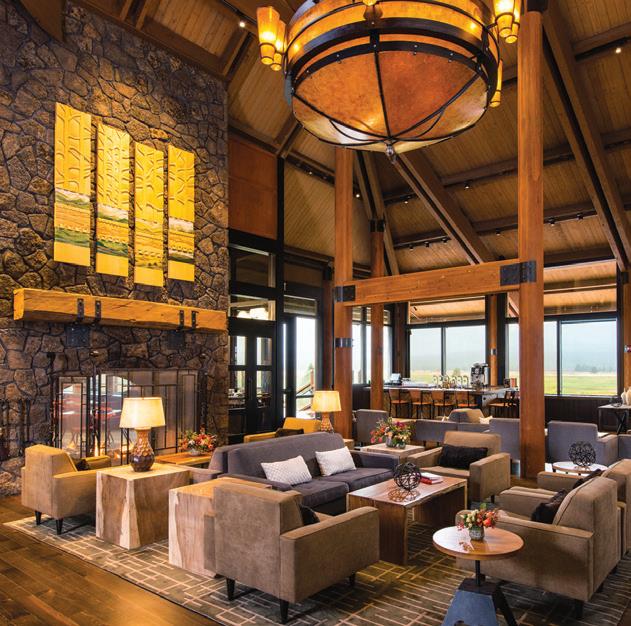
The lodge at Sunriver is pure Oregon history.
Sunriver Resort
Bandon Dunes Golf Resort (BANDON)
Find your way down the southern Oregon Coast for a golf getaway that rivals any other, anywhere. If its five Scottishinspired links courses were not enough, Bandon Dunes Golf Resorts’ newest, Sheep Ranch, a 7,000-yard, eighteenhole course with 1 mile of ocean frontage and stunning Pacific Ocean views on every hole, opens June 1, 2020.
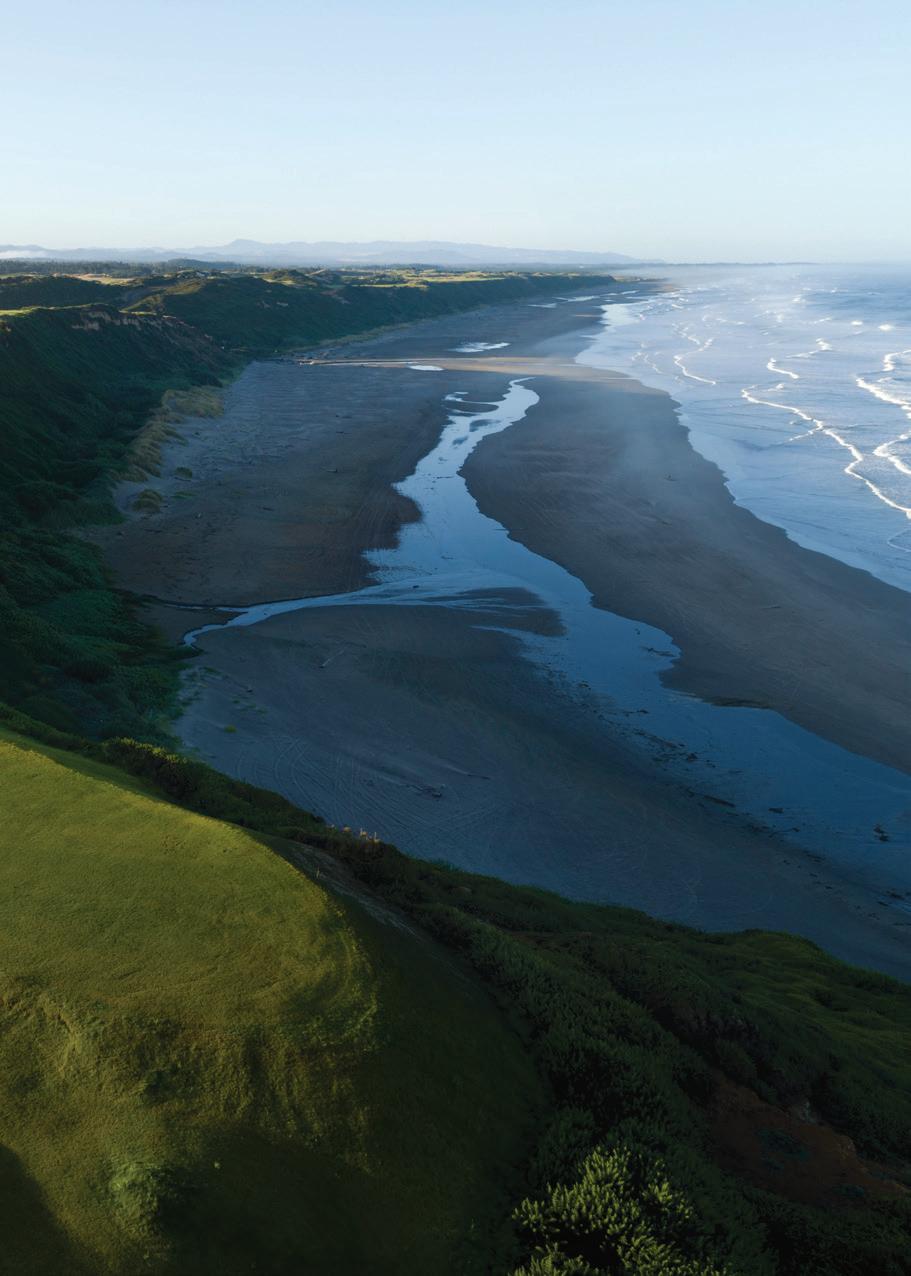
Bandon Dunes’ newest course features a mile of coastline.
Bandon Dunes Golf Resort
A walk along any Bandon course— the overcast coastal weather, the bright shock of yellow gorse bushes and the rolling green terrain—is a proxy for Scotland, the home of golf. Bandon Dunes’ founders created the massive but tasteful resort in the image of golf’s original Scottish settings.
More than golf, the resort has luxury accommodations, dining at McKee’s Pub, The Gallery Restaurant and Tufted Puffin Lounge, and a network of meditative walking trails. The Labyrinth, for example, is a maze set in the trees and used for walking and quiet contemplation.
The town of Bandon itself has local seafood restaurants not to miss—Tony’s Crab Shack, The Wheelhouse & Crowsnest and Bandon Fish Market. Now grab your clubs, make haste and don’ aywis be at the cow’s tail, as our Scottish friends say.
Silvies Valley Ranch (SENECA)
This curious destination brings out the best of us. It’s desert meditation, world-class golf, a luxury spa and … goats for golf caddies. The resort has two eighteen-hole courses, a ninehole family course and seven-hole challenge course. Goat caddies wear specially designed goat golf bags and dutifully carry a golfers’ clubs while eating on the job.
Silvies nails the male-female experiences with target shooting, cattle drives, a climbing wall, a luxury spa, horseback riding and wine tasting. Luxury cabins have stone floors, hot tubs, fireplaces, knotty pine logs and flat-screen TVs. The family style ranch-to-table dining room serves grass-fed beef, locally grown vegetables and sourdough bread made from a 100-year-old starter.
Silvies Valley Ranch is the high desert place to play hard and then get knotty.

Silvies is set in the high desert with charm to spare.
Silvies Valley Ranch
Plus: Oregon's Tribal Casinos
You know that Oregon’s eight tribal casinos are full of fun. There’s gambling, yes, but also amenities that range from spas to golf courses to a five-screen cineplex. What you may not know is the history of the tribes behind these casinos. Here’s a look at who brings you this entertainment.
Indian Head Casino is operated by the Confederated Tribes of Warm Springs— members of the Warm Springs, Wasco and Paiute tribes. The Wasco bands lived on the Columbia River and primarily fished using scaffolding along the river and spoke the Chinook language, while the Warm Springs bands lived on Columbia’s tributaries and spoke a different language—Sahaptin. They traveled between summer and winter villages. The Paiutes were a southeastern Oregon band who spoke Shoshone dialect and lived much differently on the high plains of the state—less fish, more game, and a great deal more migration.
Chinook Winds Casino Resort is operated by the Confederated Tribes of the Siletz Reservation, a group of twenty-seven Oregon, California and Washington tribes. This group, which at one time occupied a 1.1 million-acre reservation, had its tribe terminated in 1954, then was restored as a tribe in 1977. Today the confederated tribes have a smaller reservation and operate the casino in Newport.
Kla-Mo-Ya Casino is operated by the Klamath Tribes—the Klamath, Modoc and Yahooskin, all of whom occupied the Klamath Basin. The tribes believe everything they need will be provided by the earth in their home east of the Cascades, and even as they signed treaties in 1864, they retained the right to hunt, fish and gather on their lands in perpetuity, which has led to ongoing litigation regarding water rights. The tribes prospered in their early reservation days, in part due to the rich natural resources at their disposal, though a Congressional act in the 1950s terminated the tribes. The tribes’ federal recognition was not restored until the 1980s.
Seven Feathers Casino Resort is operated by the Cow Creek Band of Umpqua Indians of Oregon, a conglomerate of a number of tribal groups who lived between the Cascade and Coast Ranges in southwest Oregon. The Cow Creek band came together as one of the first two tribes to sign a treaty with the U.S. in 1853. The treaty ceded a great swath of southwestern Oregon to the U.S., but the treaty was ignored by the federal government for more than a hundred years until recognition was restored in the 1980s, without a reservation.
Spirit Mountain Casino is operated by the Confederated Tribes of the Grand Ronde Community. The group is made up of more than thirty tribes and bands from Oregon, California and Washington. The tribes spoke a variety of languages and eventually settled on Chinuk Wawa as the tribes’ common language. In 1856, the Umpqua, Southern Kalapuya, Rogue River and Chasta bands were forced onto a reservation in the Coast Range. The Grand Ronde Reservation today, about a sixth of its original size, is on that land.
The Mill Casino-Hotel is operated by the Coquille Tribe, who traditionally lived on the southern Oregon Coast. After signing a treaty in 1856 and being removed to the Siletz/Coast Reservation, most Coquille people stayed there as members of the Confederated Tribes of Siletz Indians, but some are now recognized separately as the Coquille Tribe and are located near Coos Bay. The Coquille have proposed another casino in Medford.
Three Rivers Casino Resort is operated by the Confederated Tribes of Coos, Lower Umpqua & Siuslaw, a group of three tribes who lived between the Pacific Ocean and the Coast Range on the south-central coast. The tribes lived peacefully and depended on the bounty of the sea and mountain range, and lived in cedar plank homes along the area rivers.
Wildhorse Resort & Casino is operated by the Confederated Tribes of the Umatilla Reservation. The reservation, east of Pendleton, is made up of Cayuse, Umatilla and Walla Walla tribes, and reserved rights to fish, hunt and gather food and medicine on its ceded land—today, the area of northeastern Oregon and southeastern Washington. In addition to the casino, the tribes also operate Cayuse Technologies, a software development company.



